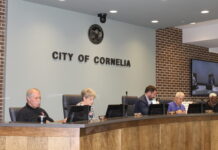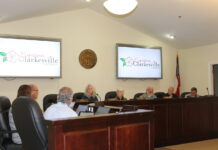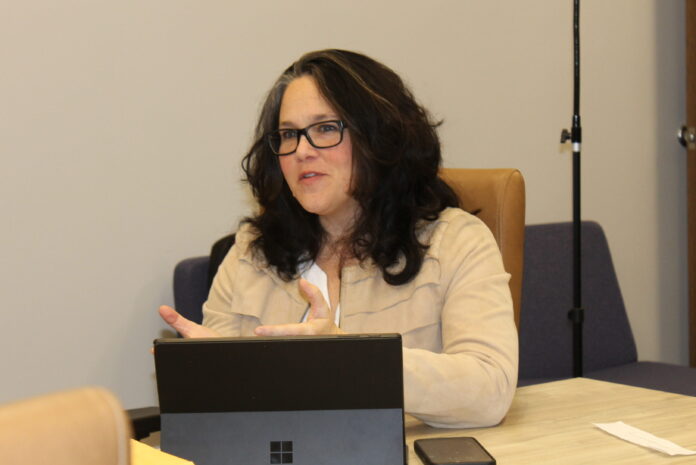
Closing the coverage gap and boosting healthcare accessibility in Georgia could start at the city level. At least that’s what’s being pushed by a well-known former Habersham County leader and founder of a Flowery Branch-based nonprofit.
Natalie E. Crawford, founder and executive director of nonprofit think tank and policy advocacy group Georgia First, sought to make a case for Medicaid expansion to Cornelia’s City Commission Tuesday, Dec. 3.
At Tuesday’s work session, Crawford, who served as a Habersham County commissioner from 2013-2020, presented data that she believes supports the economic benefit of the program’s expansion in Georgia.
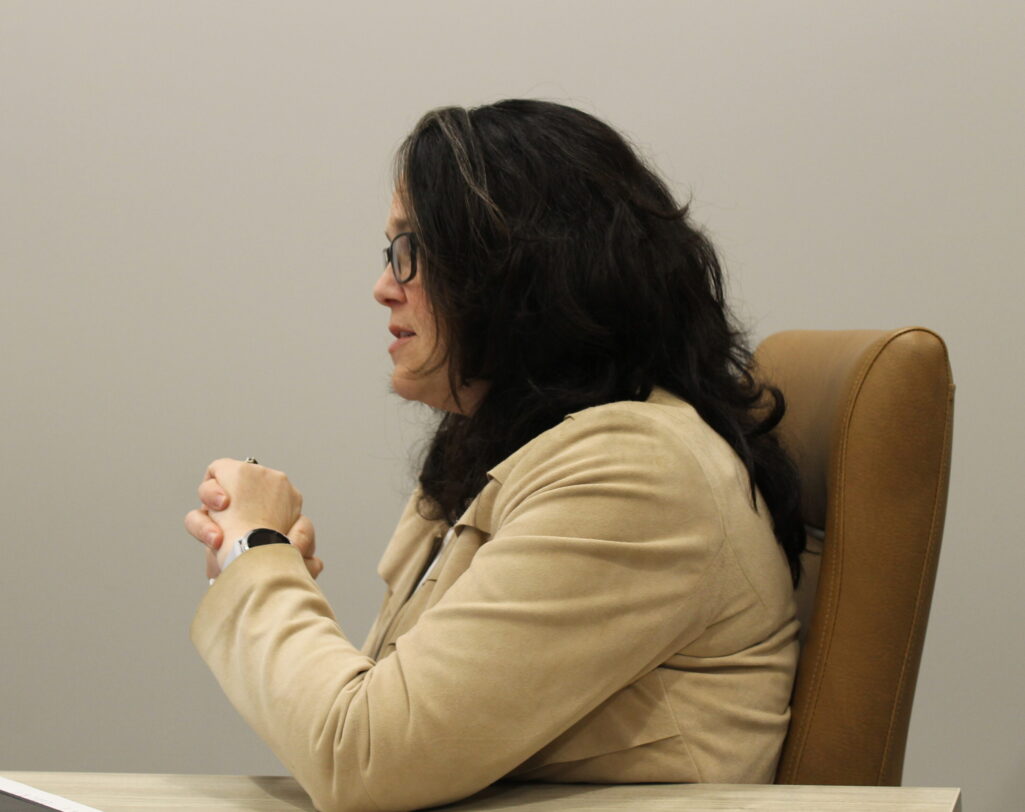
Crawford’s objective, she said, is to convince Georgia municipalities to draft urging resolutions calling on state lawmakers and Gov. Brian Kemp to support expansion of the program, with Cornelia being on her list of stops.
Georgia’s Republican lawmakers so far have been reluctant to the notion of expansion, and instead have pushed a program known as Georgia Pathways – which requires participants to provide proof they’ve performed at least 80 hours of work, volunteer activity, schooling or vocational rehabilitation a month to qualify for coverage.
A notable portion of Crawford’s presentation also centered on statewide disparities in coverage and segments of the population who find themselves without it – often for reasons more or less out of their control. Some of those people include low wage employees, agriculture workers, small business owners and around 32,000 veterans, according to Crawford.
RELATED Georgia’s work requirement slows processing for Medicaid and food stamp applications
In Georgia, Crawford said a person must make 33% of the federal poverty level or below to qualify for Medicaid.
“We have about 1.2 million Georgians, currently, that are uninsured,” Crawford told commissioners. “(Georgia) is consistently, for the last 10 years, among the top five states with the highest number of uninsured. And we have about 300,000 (working people) in the coverage gap. That means they make too much to qualify for traditional Medicaid, and they earn too little to be able to purchase a plan on the open exchange…this gap goes to about 100% of the federal poverty level.”
According to the Office of the Assistant Secretary for Planning and Evaluation, the federal guidelines for poverty of a person is marked at $15,060.
That threshold goes to $20,440 for a household of two before rising to $25,820 for a three-person home.
The figure peaks at $52,720 for a home of eight people.
Economic impact
Uninsured Georgians, according to Crawford, will often defer health-related needs until illnesses and issues become chronic and treatment can no longer be put aside. Crawford said this contributes to delayed care and increased emergency room visits – which she described as the “absolute, most expensive point of care.”
“We have about $6.2 billion of uncompensated care in the state of Georgia,” she said. “…that’s a huge number. In terms of options, what we’re talking about is a form of Medicaid expansion.”
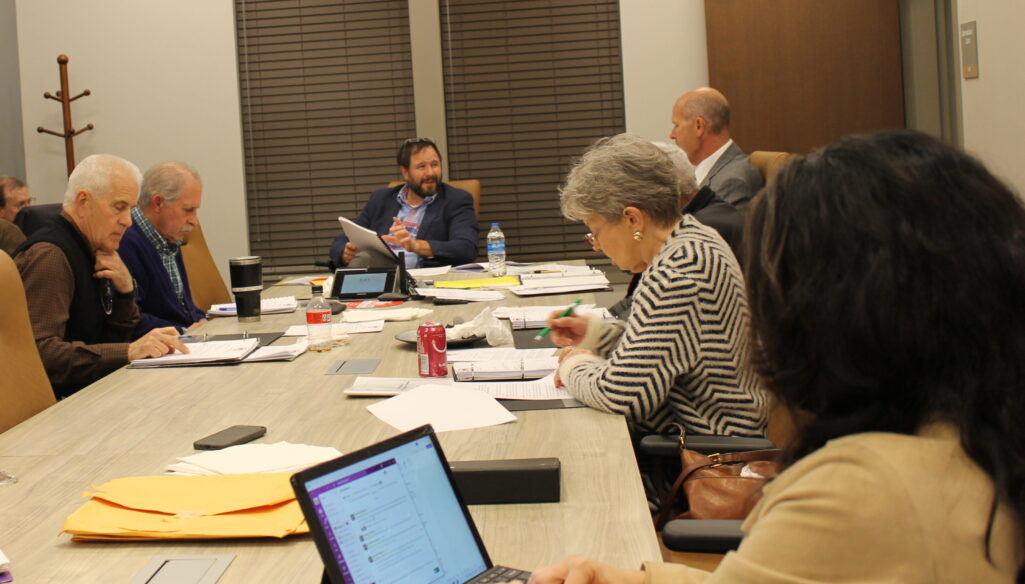
Crawford went on to propose a “legislation change” that would “expand Georgia’s covered population to 138% of the federal poverty level and below.
“…this is very important on a local level,” she said. “What we know, from studying the 40 other states that have expanded, is what we’ll see is savings as a state – from child welfare services and law enforcement costs.”
Under a 90% match from the state, compared to a 70% match today, there’s around $1.2 billion in federal funds available “to cover the cost” of Medicaid expansion in Georgia for the first two years, according to Crawford.
Crawford also cited figures from the nonprofit organization Georgia Health Initiative that suggest Georgia’s economy is “forecasted to increase by $9.4 billion in economic output and $5.5 billion in GDP (on average per year)” during the first three years of Medicaid expansion.
Crawford pointed to a number of ways she believes expansion could have a positive impact at the local level.
“(Medicaid) expansion would fuel about 51,000 new jobs per year across the state of Georgia,” Crawford said. “We would also see about a $900 increase in personal household income – every year for the first three years – (and)…about 10% premium savings for all of us.”
This impact also could reach rural hospitals, according to Crawford, namely Northeast Georgia Medical Center Habersham – which provides both jobs and proximal access to health care for the county.
“(Rural hospitals) are a huge economic driver in these communities,” Crawford said. “When a community loses a hospital, that is a 60-plus year negative economic impact. That’s not just jobs from the hospital. It is economic opportunity you lose…it’s also industry that leaves, because you no longer have access to health care. That’s an economic hit you do not recover from.”
Crawford said patients in Habersham County are around 80% Medicare/Medicaid and indigent self pay.
Medicaid expansion, she argued, could in turn bring greater economic stability to NGMC Habersham – the county’s only hospital. “By closing the coverage gap, not only are you getting more lives covered…you’re also increasing the reimbursement rate for these rural hospitals,” she said.
Cornelia’s role
Crawford concluded in requesting Cornelia’s commissioners to adopt and pass a resolution urging representatives at the state level – as well as Kemp – to consider expanding Medicaid in Georgia.
Cornelia Mayor John Borrow said the city could consider such a resolution after gathering more information and considering potential political dynamics of the proposal.
“Very interesting presentation,” Borrow said. “I like the economic development (aspects). I like that it covers people…I personally need to find out more information – as to the pros and the cons and the whys and why nots. Some of the why nots may be purely political, and I would need to know why before we throw our weight behind it.”



